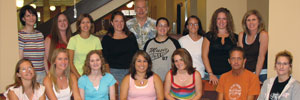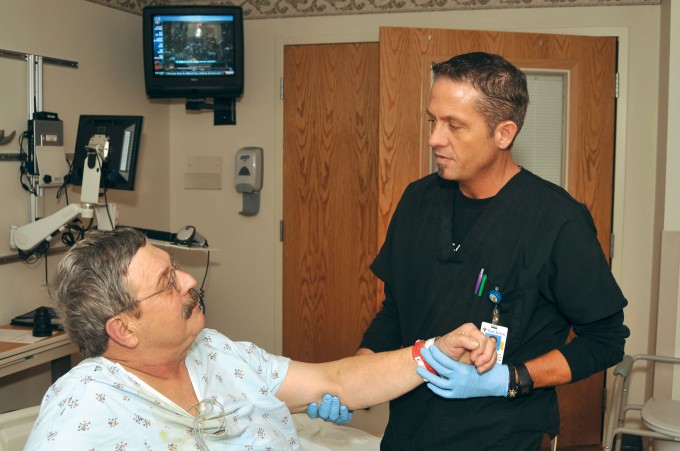
West Nile survivor Brandon Hill says it’s all about giving back
When Brandon Hill was struck with West Nile Virus in 2003, his condition became so serious at one point that physicians told his parents to prepare for his death.

The debilitating and paralyzing disease had rendered his arms useless, robbed his body of energy and fluids, and left his mind in a near-coma state.
“They didn’t expect me to live,” Hill said. “The doctors and nurses told me I was the worst case of West Nile they had ever seen without a person dying.”
Yet through what Hill can describe only as a miracle, and a year of therapy from health care professionals at Via Christi Health and other sources, Hill survived, recovered the use of his limbs, and later came to Newman University to earn a degree in the occupational therapy assistant (OTA) program.
Today, Hill is a certified occupational therapy assistant (COTA) at Via Christi Hospital on north St. Francis Street in Wichita, working to give others what he feels was given to him.
“I went to Newman to become a therapist so I could help others,” Hill said. “I went back to Via Christi because of what they did for me.”
Dehydration and delirium
Hill’s bout with West Nile began in September 2003, not long after he came to Wichita from his hometown of Great Bend, Kan.
Hill, who was 33 at the time, had moved at various times to different parts of the state and attended community colleges and universities, including Kansas State University, Barton County Community College, Kansas City Kansas Community College and others. He tried different majors — engineering, biology and physical therapy — but had not completed a program and earned mixed grades. He had worked in construction 10 years before coming to Wichita.
At the time, the country was in a serious West Nile outbreak — almost 10,000 cases and 264 deaths were reported that year by the Centers for Disease Control. Hill’s sister Rae Lyn Mefford ARNP, a nurse practitioner and 1997 Newman graduate, told Hill he was a prime candidate for the mosquito-borne disease.
“Because I worked outside, I was exposed sunup to sundown, six days a week,” Hill said. “So, I got a can of Off, but most of the time I was too busy to worry about spraying it on myself.”
A day or so after the Labor Day weekend, Hill felt his neck becoming stiff at work. He tried to shrug it off, thinking he had slept on it wrong. By that night, however, he had a 104-degree fever and severe nausea. Thinking he had the flu, Hill tried to tough it out for three days but began vomiting and suffering dry heaves. Before long he was unable to swallow or hold his head up. He lay on the floor, disoriented and unable to recognize where he was.
“I felt delirious,” Hill said. “There was no pain. It was a flu-like sickness, with dehydration from fever and nausea. As it went on I had paralysis in my upper extremities. It got so I couldn’t hold my head up.”
Finally, a friend called Hill’s sister. Hill credits her with saving his life.
She took Hill to the emergency room of a nearby hospital, but doctors told him it was the flu and sent him home. As Hill’s condition worsened, she began researching his symptoms on the Internet. She soon realized they pointed to encephalitis or meningitis, and made the connection. She took him back to the ER, and after some discussion convinced a different doctor that it was West Nile Virus.
“She would not take no for an answer,” Hill said. “She knew that respiratory failure was typical with the disease, and that is what kills people. Without her I would not be here today.”
Continued…
Tags: Barton County Community College, Brandon Hill, Clint Stucky, Encephalitis, Great Bend, Kansas, Kansas City Kansas Community College, Kansas State University, Labor Day, Meningitis, Neurocritical Care Unit, Occupational Therapy Assistant, Occupational Therapy Student Association, Outstanding Student Award, ping-pong, Rae Lyn Mefford, Via Christi Health, Via Christi Hospital, Via Christi Rehabilitation Hospital, West Nile Virus
